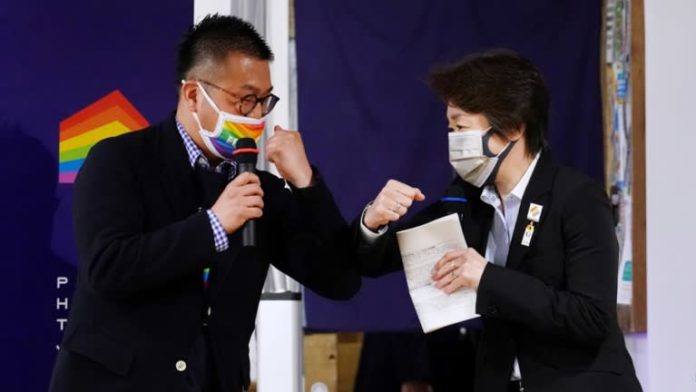TOKYO — Fumino Sugiyama, a former female fencer for the Japan women’s national team who came out as a man more than a decade ago, last week became the first transgender board member of the Japan Olympic Committee.
Speaking with Nikkei Asia less than a month from the start of the “Unity in Diversity” Games, Sugiyama said that LGBT athletes rarely speak up about their sexuality because they fear negative reactions from fans and sponsors.
“I want to help Japanese sports circles to include diverse perspectives and have more athletes feel psychological safety,” Sugiyama said.
As a transgender man, Sugiyama, now 39, said he felt the fear firsthand during his professional fencing career until he retired and came out at the age of 25. “I had been thinking that I cannot be who I really am, while being an athlete at the same time,” said Sugiyama, who added that he feared being exposed as a transgender person every time he heard homophobic remarks.
“When you are excluded from sports, it means you are also excluded from society,” said Sugiyama. “I believe sports and society are closely intertwined and if I can change sports, I can change society.”
While the focus of the summer’s Olympics has been the pandemic — whether the games would be held, and if so, whether fans would attend — Japan’s LGBT community is pushing hard to ensure the games are actually used to promote diversity. While there has been progress in recent years, political movement has been slower than societal change.
Japan’s parliament session ended in June without the passage of a law promoting understanding of LGBTQ issues. The ruling Liberal Democratic Party in 2017 pledged “to enact legislation for the purpose of promoting a broad and accurate understanding of sexual orientation and gender identity.” However, some lawmakers in the ruling parties opposed submitting the legislation because the bill said “discrimination is not allowed” despite not actually prohibiting discrimination.
Rather, the political discussions revealed that discrimination remains. An LDP lawmaker reportedly said that LGBT people are “against the preservation of biological species,” in a closed-door party meeting held to discuss the bill. Another LDP lawmaker reportedly said that “ridiculous things are happening” like [a transgender woman] participating in women’s track and field events and winning medals.
Gon Matsunaka, head of Pride House Tokyo, a group that promotes LGBT understanding, argues the bill is a matter of life and death. “There are lives lost because of the lack of legislation,” he said, pointing out that many LGBT people suffer discrimination and prejudice.
LGBT athletes in Japan are becoming more visible. One example is professional soccer player Shiho Shimoyamada, who came out as gay in 2019. Shimoyamada argues that having a law or system that respects LGBT rights will contribute to athletes’ psychological safety.
“Before coming out, I was not good at communicating with my teammates,” she told Nikkei Asia. “I think it’s because I could not be who I am in the team, and I could not fully commit to the team without feeling [that my sexuality was being] embraced.”
“In Japan, there is no [legal] backing in which we can believe that it is absolutely OK to be who we are,” Shimoyamada added. “As we depend on sponsors and fans, it is scary to be perceived negatively.”
Shimoyamada came out while playing professionally in Germany, where she felt comfortable discussing her sexuality openly. “I was just so happy to be able to talk about my partner and not having to tell a lie,” she said, adding that she would not have been able to come out if she were in Japan, then.
Earlier this year, Airi Murakami, a 31-year-old female rugby player, came out as gay. Last month, Kumi Yokoyama, a former national team striker who plays professional soccer in the U.S., came out as a transgender man. U.S. President Joe Biden showed his support for Yokoyama, tweeting: “I’m so proud of your courage. Because of you, countless kids around the world are seeing themselves in a new light today.”
Maki Muraki, head of the nonprofit organization Nijiiro Diversity, argues the Olympics have contributed to LGBT visibility. In London 2012, 23 openly LGBT athletes participated in the games. In the 2016 Games in Brazil — the first country to host the games that recognized marriage equality — more than 50 openly LGBT athletes competed.
“These games in the past promoted LGBT rights,” Muraki added.
The Olympic Charter amended its anti-discrimination policy to include sexual orientation after the Sochi Winter Games in Russia in 2014. Russia has introduced anti-gay legislation. The revised charter now reads: “The enjoyment of the rights and freedoms set forth in this Olympic Charter shall be secured without discrimination of any kind, such as race, color, sex, sexual orientation…”
With the first transgender athlete — New Zealand weightlifter Laurel Hubbard — participating in Tokyo, the Olympics are expected to shed a light on diversity issues in Japan.
Sugiyama of the JOC said he acknowledges there is a lot of debate going on about the fairness of the Games.
“No personal attacks should be directed at her,” Sugiyama said, in reference to Hubbard. He lamented that most attention is paid to the discussion of fairness, and little is paid to the unfairness or difficulties that transgender people would go through in everyday life.
“The confusion of various discussions is an opportunity for society to take a step forward,” said Sugiyama. “It is still meaningful that this kind of topic starts getting discussed, as we had been long ignored it,” he added.
Shimoyamada said she hopes the games will offer more people the opportunity to recognize that there are more LGBT people around them than they might expect. “In Japan, it is considered good to act like others, but we need to think based on the premise that everyone is different,” she added.
When it comes to LGBT issues, Muraki said there is a silver lining in Japanese society, such as support from business circles. Hiroshi Mikitani, CEO of Rakuten, last month tweeted support for LGBT equality. Muraki expects international pressure to be put on Japan again in 2025 when the country hosts another big international event, the World Exposition in Osaka.
“The government should bear in mind that promoting LGBT rights is something they should do spontaneously without external pressure,” Muraki added.









